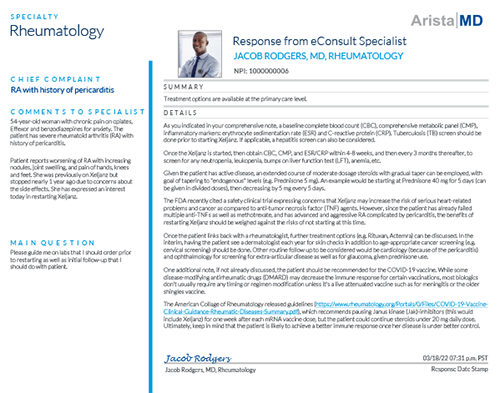Request an eConsult Demo

eConsult with a Rheumatology Physician Supports Patient Access to Comprehensive Care
With long specialist wait times, providers across the country are turning to eConsults to offer comprehensive rheumatology care. They often help patients manage chronic conditions like rheumatoid arthritis while dealing with the realities of limited access to specialists. Specialist shortages, limited access, and long wait times for specialty care can negatively impact patient outcomes.
Electronic physician-to-specialist consultations, or eConsults can help mitigate the challenge of specialist shortages and other delays in treatment by offering comprehensive rheumatology care. An eConsult is an asynchronous physician-to-physician communication about a patient, conducted over a secure digital platform, that enables PCPs to leverage the expertise of physician specialists like rheumatologists. eConsults gives patients immediate access to specialists from within a primary care setting.
We use rheumatoid arthritis, a disease that affects about 1.5 million US adults, as an example of how eConsults can help PCPs work with specialty physicians to manage a chronic, complex disease.
How eConsults Help with Rheumatology Care
Diseases like RA can be difficult to diagnose since severity and symptoms vary from patient to patient. With RA, there are 6 commonly-used tests that rheumatologists use to diagnose the disease. Working with a rheumatologist is important for accurate diagnosis and staging. But timely access to a rheumatologist can be challenging due to a shortage of rheumatologists, high demand, and the resulting long wait times for consults.
In 2018, the American College of Rheumatology announced this shortage was at crisis levels, with over half of practicing rheumatologists expected to retire over the next 15 years. At the same time, early diagnosis and aggressive treatment are key to better patient outcomes, so access to comprehensive rheumatology care is incredibly important as early in the disease process as possible.

